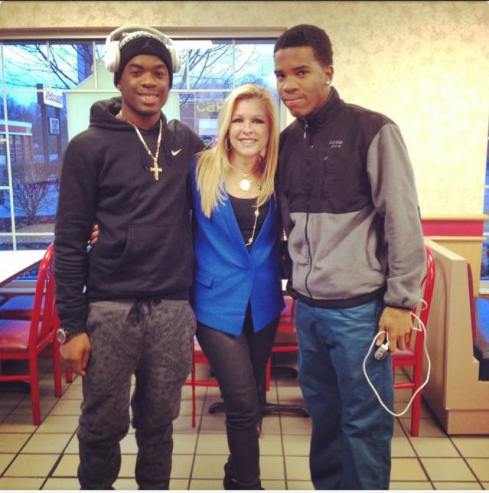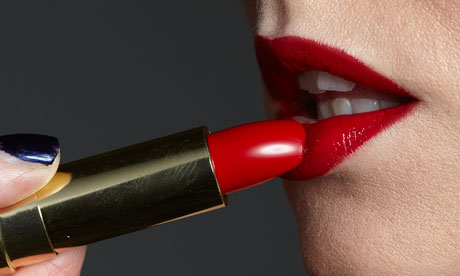Leigh Anne Tuohy, Racism, and the White Saviour Complex
15DEC
From:
http://bellejar.ca/2014/12/15/leigh-anne-tuohy-racism-and-the-white-saviour-complex/
Leigh Anne “That Nice Woman Sandra Bullock Played In The Blind Side” Tuohy recently posted the following picture and caption on her Facebook and Instagram accounts:
“We see what we want! It’s the gospel truth! These two were literally huddled over in a corner table nose to nose and the person with me said “I bet they are up to no good” well you know me… I walked over, told them to scoot over. After 10 seconds of dead silence I said so whats happening at this table? I get nothing.. I then explained it was my store and they should spill it… They showed me their phones and they were texting friends trying to scrape up $3.00 each for the high school basketball game! Well they left with smiles, money for popcorn and bus fare. We have to STOP judging people and assuming and pigeon holing people! Don’t judge a book by its cover or however you’d like to express the sentiment! Accept others and stoping seeing what you want to see!!!“
The comments on both posts are full of people praising her – telling her how awesome she is, how open-minded, how kind. Reading these responses is completely baffling – like, did these people and I all read the same words?
Let’s break down what happened here:
1. Two teenagers were sitting alone and completely minding their own business.
2. A white woman decides that based on the fact that they are “huddled” in corner “nose to nose,” they must be “up to no good.” Because obviously whenever Black people (especially Black men) gather in public, it’s bad news for the rest of us!
3. Another white woman, one Leigh Anne “I Adopted A Black Boy So I Can’t Possibly Be Racist” Tuohy, decides that White Lady #1 is wrong. Which is actually the correct assumption for Ms. Tuohy to make, so I guess this is where some people are getting confused because we see that her intent is good, and that makes us want to believe that the action that follows will also be good. She’s at a crossroad here – two roads diverged, etc. Had she taken the road less travelled, Ms. Tuohy might have said to her friend, “Wow, you’re being really racist right now! I’m not comfortable with how this conversation is going.” Instead, she decided to confront the teenagers who, as a reminder, have done absolutely nothing wrong.
4. Leigh Anne Tuohy walks over to the two boys and sits there in silence. I’m sure that wasn’t scary for two Black teenagers at all, especially given recent events.
5. After what was certainly the most awkward ten seconds of those boys’ lives, Ms. Tuohy asks what’s “happening” at the table. Like, other than two teenagers sitting there talking like anyone sitting at a table might do? Some kids are hanging out and chatting. That is what’s happening.
Unsure of the correct answer to this question – other than “we are two friends sitting together and not causing any trouble,” which probably seemed too obvious for them to point out – the boys remain silent.
6. Leigh Anne tells them that this is her store and they need to “spill.” Again, these kids have done nothing except be in public and be Black.
7. After being interrogated by this woman, and probably afraid that at the very least she’s about the call the cops, the boys show her their phones. This part just breaks my brain, like, these two kids had to show this woman evidence that they are doing exactly what they seem to be doing: sitting at a table and having a conversation.
8. Apparently satisfied with the evidence the boys have presented her with, Leigh Anne Tuohy gives them bus fare and money for popcorn, but not before she has White Lady #1 take her picture with them.
9. Ms. Tuohy then posts this picture to social media and receives thousands of responses lauding her for being such a good person.
Leigh Anne Tuohy profiled two Black kids, invaded their privacy and interrogated them, but somehow people are behaving as if this is some kind of wonderful social justice moment. No. Not even a little. This is some fucked up racial profiling combined with white saviourism, and it is racist as hell. Assuming that those kids were doing something bad was racist. Assuming that she could take up space at their table was racist. Insisting that they talk to her was disrespectful and racist. Wanting evidence that they weren’t up to no good was racist. Treating those boys as props to make her look good and then posting this picture publicly (and honestly, I wonder if the boys consented to that) is incredibly racist.
Also, can we talk about how problematic using the phrase “don’t judge a book by its cover” is when it comes to talking about race? First of all, it begins with the assumption that the “cover” (or in this case, skin) tells you something unappealing about the contents of the book or person. It also infers that there is something unattractive or bad about the “cover” (or, again, skin). I can’t believe that I have to say this, but: there is nothing wrong or bad about Black skin. Black skin is not unpleasant or ugly, and to imply that dark skin might devalue someone is really, really fucked up.
Black people aren’t things. They don’t exist just so that white people can make a point about themselves. These are two real kids who not only had to endure this woman’s microaggressions but have now had their image splashed all over social media – the Facebook picture alone has 150,000 likes and over 12,000 shares. Step away for a hot second from this white woman’s narrative, and think about how those teenagers must feel – having their privacy invaded, having assumptions made about them based on their race, and now having a white woman use their images to get praise for herself.
Now tell me again about how Leigh Anne Tuohy did a good thing.









